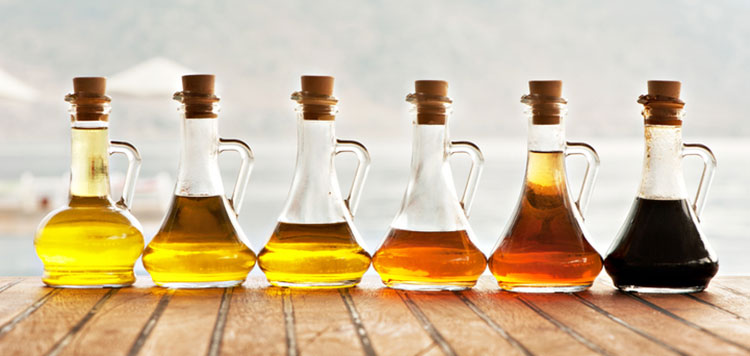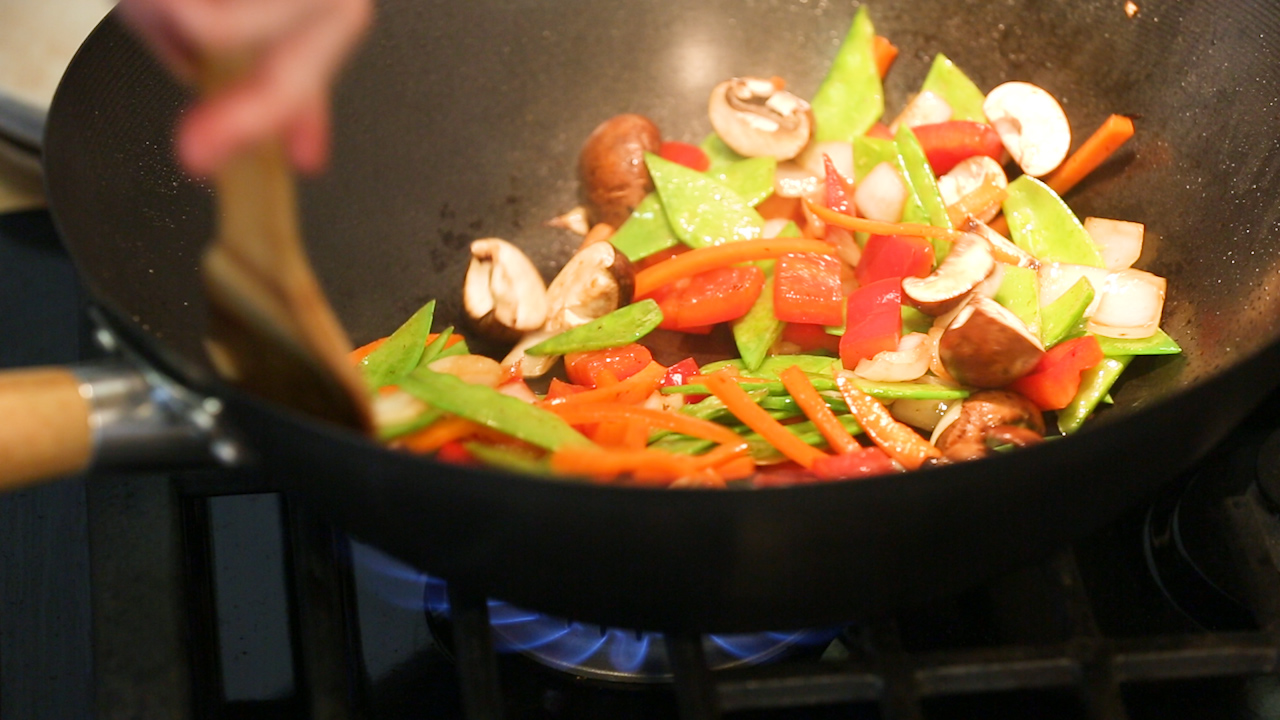Amidst the yellow sea of similar looking cooking oils, it’s easy to stick to what’s familiar. But each has its own unique purpose. Some work best at high temperatures. Some are meant for simmering. Some taste great no matter what you do, and others barely have a flavor at all. Check out our cooking oil guide to find out the benefits, uses, and characteristics of each cooking oil.
Olive Oil
Primarily used in Mediterranean cooking, olive oil has come to be used for almost everything. It’s one of the oldest known culinary oils in the world. There are actually two types of olive oils: extra virgin is made from cold-pressing olives, and light olive oil is refined.
Smoke Point: 320°F – 468°F
Characteristics: pale yellow or green, monounsaturated
Benefits: High in vitamin E
Great for: all purpose, salad dressings, marinating, sautéing, pan frying, deep frying, stir frying, grilling, broiling, and baking
Peanut Oil
Peanut oil is a refined oil made from pressed steam-cooked peanuts. It is popular in Asian cooking and known for its high smoke point. It has a nutty scent and strong flavor.
Smoke Point: 450°F
Characteristics: pale yellow, monounsaturated
Benefits: High in Vitamin E and phytosterols
Great for: marinating, sautéing, shallow frying, deep frying, roasting, searing, and grilling
Vegetable Oil
You should always have vegetable oil on hand. Its neutral flavor makes it a great option no matter what you’re cooking. It is a plant-based oil and often a combination of other refined oils, made from the seeds of olives, soybeans, corn, peanuts, cotton seed, and palm nuts.
Smoke Point: 360°F – 450°F
Characteristics: light color, polyunsaturated
Benefits: Contains omega-3 fatty acids and phenolic compounds
Great for: all purpose, salad dressings, marinating, baking, sautéing, roasting, frying, and searing
Canola Oil
Canola oil is made by pressed the rapeseeds of the canola plant. It’s similar to vegetable oil in color, flavor, smoke point, and usage.
Smoke Point: 400°F
Characteristics: light, golden color, monounsaturated
Benefits: High in omega-3 fatty acids, alpha-linolenic acid
Great for: all purpose, salad dressings, marinating, sautéing, roasting, frying, and searing
Grapeseed Oil
This versatile oil is actually a by-product of wine-making. It has a fairly neutral flavor and is light green in color.
Smoke Point: 392°F – 420°F
Characteristics: light green color
Benefits: Contains unsaturated fats and vitamin E
Great for: salad dressings, marinating, sautéing, roasting, shallow frying, and searing
Sunflower Seed Oil
This odorless and nearly flavorless oil is made from pressed sunflower seeds and very low in saturated fat.
Smoke Point: 450°F
Characteristics: pale yellow, polyunsaturated
Benefits: High in vitamin E and omega-6 fatty acids
Great for: salad dressings, marinating, sautéing, roasting, and as shortening
Corn Oil
Ever wonder what fast food chains use to fry your French fries? Corn oil, a refined oil made from the germ of corn kernels, is low in good fats and should be used sparingly.
Smoke Point: 450°F
Characteristics: medium yellow color, polyunsaturated
Benefits: High in omega-6 fatty acids, vitamin E, and phytoserols
Great for: salad dressings, sautéing, roasting, frying, searing, and as shortening
Coconut Oil
Although it offers much more, coconut oil is very popular in vegan baking due to its natural sweet flavor and tropical scent. It’s often used as a replacement for butter and is solid at room temperature.
Smoke Point: 350°F
Characteristics: nearly colorless, saturated
Benefits: High in vitamin E, K and iron
Great for: sautéing, roasting, and as confectionary shortening
Flaxseed Oil
Flaxseed oil can give off a strong fishy, smell and taste if applied heavily. It’s best to add a small amount of flaxseed oil to no-heat dishes or sauces for a touch of flavor.
Smoke Point: 226°F
Characteristics: nutty flavor, sensitive to variations in oxygen, light and temperature
Benefits: High in potassium and omega-3 fatty acids
Great for: adding flavor and seasoning cast-iron pans
Sesame Oil
Sesame oil has a very distinct scent and flavor. Popular in Middle Eastern and Asian cooking, it’s made from toasted sesame seeds. You can find both light and dark varieties; the darker it is, the more toasted the seeds were and the stronger the flavor.
Smoke Point: 410°F
Characteristics: light yellow to black, polyunsaturated
Benefits: High in vitamin E and K
Great for: all purpose, salad dressings, marinating, sautéing, roasting, and adding flavor
Avocado Oil
Unlike most oils that are extracted from a nut or seed, avocado oil is extracted from the fruit itself. It has a mild avocado aroma and slightly grassy, soft nutty taste. With a high smoke point, it can be used for very high temperature applications.
Smoke Point: 520°F
Characteristics: green hue, monounsaturated
Benefits: High in potassium, oleic acid, antioxidants, and vitamins A, E, and D
Great for: salad dressings, marinating, sautéing, roasting, stir frying, searing, and adding flavor
Soybean Oil
Soybean oil is fairly heavy; you’ll notice its strong flavor and aroma. It’s commonly used in processed foods and has short-shelf life.
Smoke Point: 450°F
Characteristics: light yellow to clear, polyunsaturated
Benefits: High in omega-6 fatty acids and vitamin K
Great for: salad dressings and shortening





